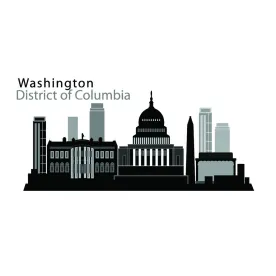Economic Stimulus Negotiations End. Again. With the current acrimony between Republicans and Democrats at a significant low point, the Buzz did not exactly go out on a limb last week in predicting that there would not be a further economic relief package from Congress prior to the elections on November 3, 2020. Well, President Donald Trump seemed to make it official this week when he tweeted that he would be ending negotiations going forward. Of course, in typical D.C. fashion, where deals and legislation never completely die, rumors of a deal persist, though the Buzz remains doubtful that there will be an agreement prior to the elections.
SCOTUS Update. Despite the COVID-19 outbreak that has hit Capitol Hill and the White House, beginning on October 12 and continuing through October 15, 2020, the U.S. Senate Committee on the Judiciary will hold hearings on the nomination of Judge Amy Coney Barrett to the Supreme Court of the United States. With Judiciary Committee members Mike Lee (R-UT) and Thom Tillis (R-NC) testing positive for COVID-19, and with health and safety concerns in sharp focus, the committee will conduct hearings in person as of now, but with a virtual option. (While this would be the first “hybrid” hearing for a Supreme Court nominee, the Judiciary Committee has had multiple such hearings this year for other nominations to the federal bench.)
Republicans senators enjoy a slim 12–10 majority on the Judiciary Committee. Still, the potential physical absence of senators from the hearings will not necessarily doom Barrett’s nomination. This is because the Senate allows proxy voting in committee, while voting on the Senate floor must be done in person. Moreover, the Judiciary Committee does not need to report favorably on a nomination in order to send a nomination to the floor for a vote by the full Senate. In fact, 33 years ago this week in 1987, the Judiciary Committee reported the Supreme Court nomination of Judge Robert H. Bork as “unfavorable” while sending it to the Senate floor. And in 1991, the Judiciary Committee deadlocked, 7–7, and sent then-judge Clarence Thomas’s nomination to the Senate floor without a recommendation. Voting math in the full Senate is a different story, however, and we will have more on those calculations as events unfold.
H-1B Restrictions Unveiled. This week, U.S. Citizenship and Immigration Services (USCIS) and the U.S. Department of Labor (DOL) issued new rules that will greatly impact employers that supplement their workforces with H-1B visa holders. The rules make it more expensive to hire such workers and create new limitations on the definitions of “specialty occupation” and the employer-employee relationship. Brian D. Bumgardner, Christian O. Herrmann, and Alexandra Holland have the details. Reforming the H-1B program has been on the Trump administration’s agenda almost since day one, and with less than a month to go until the national elections, the DOL and USCIS decided to finalize the rules without the benefit of public comment or review by the Office of Information and Regulatory Affairs. Further, the H-1B rule was approved by Acting Secretary of Homeland Security Chad F. Wolf, whose appointment a federal judge recently found might have been invalid. A short-circuited rulemaking process and Wolf’s questionable legal authority make the H-1B rule particularly prone to legal challenge.
EEOC Issues Conciliation Proposal. This week the U.S. Equal Employment Opportunity Commission (EEOC) issued a proposed rule to provide “greater clarity to the conciliation process by enhance[ing] the effectiveness of the process [to] ensure that the Commission meets its statutory obligations.” The proposed amendments to the EEOC’s conciliation procedures require the Commission to provide to a respondent:
-
“a summary of the facts and non-privileged information that the Commission relied on in its reasonable cause finding, and … the criteria that will be used to identify victims from the pool of potential class members”;
-
“a summary of the Commission’s legal basis for finding reasonable cause, including … non-privileged information it obtained during the course of its investigation that raised doubt that employment discrimination had occurred”;
-
“the basis for any relief sought, including the calculations underlying the initial conciliation proposal”; and
-
“identification of a systemic, class, or pattern or practice designation.”
The proposal also gives the respondent “at least 14 calendar days to respond to the initial conciliation proposal from the Commission.” Comments are due on or before November 9, 2020.
OFCCP Releases Diversity Training FAQs. This week the Office of Federal Contract Compliance Programs (OFCCP) released frequently asked questions in response to President Trump’s “Executive Order on Combating Race and Sex Stereotyping.”
Contract Bar Briefing Deadline. October 7, 2020, was the deadline for interested amici to file briefs in the National Labor Relations Board’s (NLRB) case contemplating changes to its “contract bar” doctrine, which prohibits representation elections during the life of a collective bargaining agreement for up to three years.
Lasting Legacy. It was reported this week that Lyon Gardiner Tyler Jr., of Franklin, Tennessee, died on September 26, 2020, at the age of 95. Amazingly, Mr. Tyler was the grandson of the United States’ 10th president, John Tyler, who was born in 1790! President Tyler had more children than any other president: eight with his first wife, Letitia Christian Tyler (who died of a stroke in the White House in 1842), and seven with his second wife, Julia Gardiner Tyler. In 1853, Julia Gardiner Tyler gave birth to Lyon Gardiner Tyler Sr., when President Tyler was 63 years old. Lyon Tyler Sr., who served as the 17th president of the College of William & Mary, had children late in life, just like his father: Lyon Tyler Jr. was born when his father was 72 years old. Three years later, Lyon Tyler Jr.’s younger brother, Harrison Ruffin Tyler, was born. Harrison Tyler—grandson of President Tyler—is still alive today.




 />i
/>i

